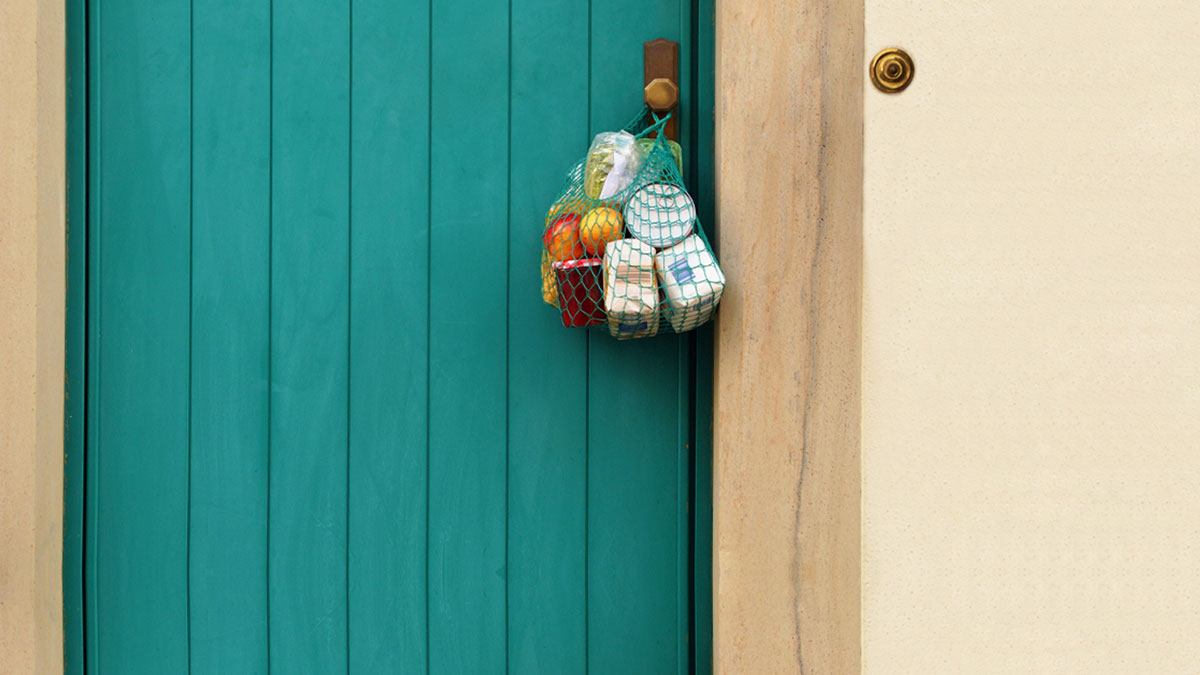Companies that have an “impact for good”
How can the power of the market be used to drive positive developments forward, while not losing sight of returns?

Publié le 06.08.2020 HAEC
Virtually overnight, restaurants, school and company canteens stopped buying from their wholesalers – while supermarket shelves remained empty. The lockdowns have made many highly developed countries aware of the vulnerability of their supply chains. And it has brought us closer to regional, seasonal products.

A picture many people are familiar with in Corona times: fuelled by a new willingness to help, more and more local food found its way into the shopping bag. © GettyImages
By
Hazel Sheffield,
multimedia journalist reporting for Wired, the Financial Times, The Economist and more.
We feature her report here as part of our Publishing Partnership with Wired UK.
When Sean Chambers was furloughed from his job cooking meals for a company of 600 people in the City of London, he decided to pursue his bread-baking hobby a little more seriously. He posted on Nextdoor, a neighbourhood site, that he was a local sourdough baker making loaves and croissants for delivery in the area. In the ten weeks since, Chambers has gone from making a handful of loaves on a Sunday to growing a successful micro-enterprise, baking more than 100 loaves a week. “Bread is not a luxury,” Chambers says, adding that the growth of his business is proof that people faced with empty supermarket shelves and long waiting times for online delivery slots, are changing their habits “both in terms of what they are buying and what they are growing”. “We have been inundated with orders,” he says.
Before coronavirus, UN agencies were already predicting global food insecurity because of conflicts in Yemen, Central Africa and the Middle East.
In April, beneath the coronavirus headlines, environmental reporters were covering a second wave of desert locusts sweeping across East Africa in north and central Kenya, Ethiopia and Somalia, eating everything green. In Latin American and the Caribbean, socio-political crises and weather extremes have led to high food prices. In Southern Africa, poor rains, volatile food prices and unresolved political and economic instability are expected to make existing food supply problems even worse. And the UN has called for cuts to the carbon emissions from the food industry, which have ballooned to a quarter of all global emissions as farming practices have become more intensive and supply chains have grown longer.
It took the shock of coronavirus for many developed countries to notice the fragility of their own systems.
Overnight, thousands of restaurants, school cafeterias and workplace canteens stopped buying produce from wholesalers. At the same time as shoppers were confronted with rationing and bare shelves at major supermarkets, farmers from Wisconsin to Wales were faced with an oversupply of milk, forcing some to dump gallons of fresh milk into lagoons and manure pits. Many wholesalers were forced to pivot. Some worked with food banks and community businesses to distribute surplus food. Others started to sell directly to consumers. One supplier, Nature’s Choice, set up a paypoint on its website and put together seasonal vegetable boxes of a quality normally only available to the capital’s top chefs.
Vernon Mascarenhas, the company’s commercial director, says he sees the shift to seasonal produce as one of several changes to the timing and availability of supply that are on the way:
“With global warming, the season is earlier by one day a year.”
And he explains: “What that means is, in 30 years our season will be one month earlier. We already have French and Italian apricots and cherries growing in Kent. In a few years, there is even the opportunity for peaches and nectarines.”
Meanwhile supermarkets that saw their global supply chains tremble during the crisis will face further disruption. The UK currently imports around half of its food, according to government figures. A third comes from the EU, including chillies, cucumbers and spinach, while products such as beans, honey and avocados are among the 20 per cent of produce imported from further afield.
Leigh Sparks, professor of retail studies at the University of Stirling, says the impact of coronavirus on supermarkets is unprecedented, but also representative of a “class of issues” including Brexit, protectionism and climate change.
“The system is basically a long chain but quick response just in time system that runs on small variations and predictability.”
“Throw in any barriers – tariffs, borders, lack of pickers – and the system is disrupted. Throw in cheap food from the US with lower standards and the system comes under more pressure.”
Sparks says supermarkets can mitigate these disruptions if they can predict what is coming and prepare. Supermarkets might start by rerouting systems, increasing stockholdings, building warehouses and bringing production back into the UK, he says, “But that takes time and could cost money.”
Community-run organizations that have established hyperlocal supply chains are now turning their attention to making the shift a permanent one. “The whole system has changed,” says Sally-Anne Watkiss, treasurer at Homebaked, a community bakery next to the Liverpool Stadium in Anfield. “The economy is working the other way round.”
Homebaked traditionally makes big sales of pies on match day. Since coronavirus, it has been baking 70 loaves a day for local food banks and a community centre. Its bread has been included in food boxes distributed by the local food bank, alongside meat from a butcher in nearby Walton Vale and freshly made frozen meals from local pubs, transforming the food distributed to the poorest people in the area from the usual donated cans at the end of supermarket checkouts into fresh, local produce. The nearby Asda, once the supermarket giant in the area, is buying Homebaked’s pies to feed its own staff.
“Lockdown has benefitted local stores, local communities and shorter supply chains,” says Sparks. “They have also been overwhelmed in some cases, but in others have succeeded with tighter local interaction and product availability. What we do not know is how that will play out as things go back to normal, whatever that is. If more people stay working from home then local will become more important.”
Publié le 06.08.2020 HAEC